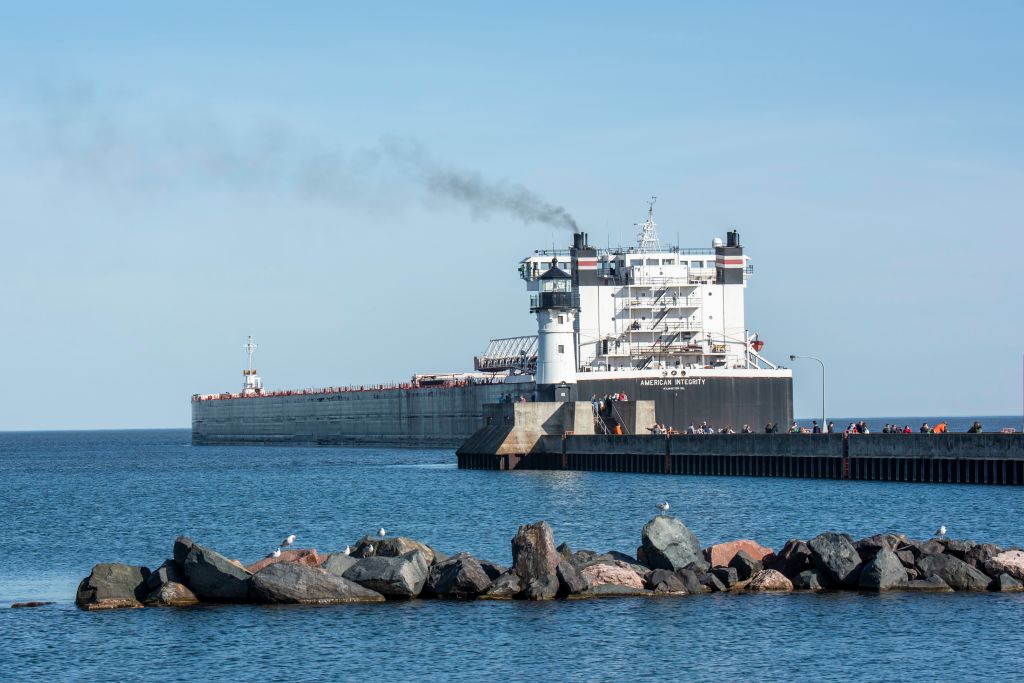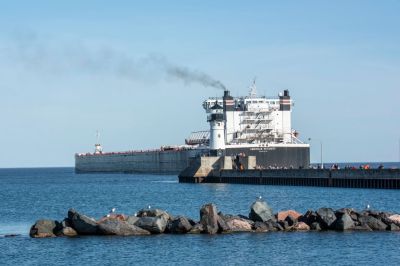Challenges posed by the Jones Act have been a recurring news story in recent years. The federal law, established by President Woodrow Wilson in 1920, requires that ships transporting goods over U.S. waters meet specific criteria: They must have been built in the U.S., operated under American ownership and crew, and fly the U.S. flag, for example.
Advocates of the Jones Act herald it as a safeguard of national security and a protector of American jobs, yet detractors paint a different picture—one of economic inefficiency, inflated costs, and harm to American manufacturing.
What led to the law?
Following the depletion of the U.S. merchant fleet during World War I, and the security risks of depending on foreign vessels, industry and political leaders began calling for a stronger domestic shipbuilding industry.
“It was part of an overall maritime strategy the U.S. had at the time to ensure that the U.S.—as a seafaring nation—could sustain its own commerce and provide for its national defense,” explains Gabriela Rodriguez, a policy adviser at American Compass, a think tank that advocates for national industrial policy.
The legislation’s authors hoped it would ensure that the U.S. would have a sufficient number of ships to transport goods, enough mariners to crew them, and domestic shipyards for vessel construction and maintenance. But there’s more to the story.
At the time, Alaska imported many of its goods via Canadian shipping, often more cost-efficient than American shipping.
“American shipping companies in Seattle really hated this,” Colin Grabow, a research fellow at the Cato Institute, tells The Dispatch.
Enter Washington’s Sen. Wesley Jones, the legislation’s namesake. “He’s lobbied by Seattle shipping companies saying, ‘Hey, can you do something about this issue we have in Alaska where people are using foreign ships and we think they should all have to use our ships?’” explains Grabow.
Jones argued excluding the domestic shipping requirements would pit American shipping against foreign competition, thereby undermining the U.S. shipping industry Congress was trying to fortify.
Did it work?
Jones Act advocates and opponents agree that it failed to create a strong shipbuilding industry in the U.S. The industry declined in the 20th century, and continues to worsen in the 21st century. That’s a problem for the U.S. Navy in particular, since U.S. shipbuilding capacity pales in comparison to China’s.
“The Jones Act doesn’t work as intended at this point of time, but the correct solution isn’t repeal. It’s strengthening it,” Rodriguez tells The Dispatch. “How can we use the policy toolkit we have today to make sure the Jones Act can accomplish its intended goal?”
But other policy experts believe the law should be repealed entirely because it “demonstrably failed to deliver a vibrant shipbuilding market and it doesn’t even provide us with self-reliance,” says Grabow. “My attitude is: Get rid of dumb Jones Act protectionism. It doesn’t work. It imposes a tax on American consumers and businesses, making us less competitive.”
Why is shipping expensive?
Grabow argues the Jones Act makes shipping within the United States more expensive because shipbuilding is more expensive here.
“To build a ship in the United States costs four to five times more than one built abroad,” says Grabow, noting the cost of oil tankers constructed abroad is about $45 million compared to $185 million. The price gap is the result of a cycle with no end in sight. Low demand for U.S.-made ships discourages American shipyards from producing more of them, which kills efficiencies realized by scaling up production. But those higher prices deter shippers from purchasing ships.
“The U.S. shipbuilding industry is locked in a cost/quantity trap, one that it appears unlikely to escape,” concludes a 2007 National Defense University report.
The U.S. is averaging fewer than three new ships per year that comply with Jones Act requirements, Grabow says. This year will see only one new Jones Act compliant vessel, with the next one not projected to be completed until 2026. Rather than promoting the acquisition of domestically built vessels, the Jones Act has actually dissuaded ship acquisition, thus reducing the U.S. merchant fleet. This leads to the continued use of older ships, which often travel to Chinese shipyards for repairs.
Even the Jones Act-compliant U.S. ships that are delivered here rely heavily on foreign materials, including from the China State Shipbuilding Corporation, which poses national security risks.
Rodriguez concedes that the Jones Act “could create a sort of security risk that the ship’s owner may not even be aware about.” She argues the Jones Act needs “updating” to require that some of these components, particularly electronics, be U.S.-made.
The Jones Act’s effect on Puerto Rico.
Meanwhile, regions outside the U.S. mainland—Hawaii, Alaska, Puerto Rico, and Guam—are disproportionately impacted by the Jones Act because they are more dependent on shipping, Garbow says.
Puerto Rico must buy all its liquefied natural gas (LNG) from foreign countries “even though the United States is the world’s second leading exporter of LNG because there are no ships to transport” the gas from the U.S. mainland to Puerto Rico, Grabow says.
“The same month that Russia was invading Ukraine, Puerto Rico was importing Russian natural gas. I mean, that’s crazy,” he adds.
When Hurricane Fiona hit Puerto Rico last year, a foreign ship carrying diesel fuel from Texas was initially forbidden from docking and delivering the fuel to Puerto Rico because the vessel did not meet Jones Act requirements. Days later, amid mounting pressure as the fuel was needed to restore power to the island, the Biden administration issued a temporary waiver, allowing the ship to dock in Puerto Rico.
Does the Jones Act protect ‘America’s workers’?
Some Jones Act supporters contend that it helps protect American jobs, including President Joe Biden, who reiterated his support for it in a White House statement on the day he took office.
“I share your support of the Jones Act,” Transportation Secretary Pete Buttigieg said to Washington Sen. Maria Cantwell during his Senate confirmation hearing. “It is so important to a maritime industry that creates hundreds of thousands of jobs, as well as a shipbuilding industry here in the U.S.”
But Grabow views the U.S.-crewed requirement as counterproductive because there’s currently an American mariner shortage. In 2017, the U.S. Maritime Administration (MARAD) estimated a mariner deficit of “1,800 qualified licensed and unlicensed mariners needed in the event of a full mobilization,” a shortage which MARAD believes has since grown. Since there’s too little competition for these jobs, they don’t need government protection, Grabow argues.
“We’ve made shipping so uncompetitive that people don’t use it unless they absolutely have to. Basically, ships are only used to transport goods to Hawaii, Alaska, Puerto Rico, Guam—places where you basically have no alternatives like trucks or rail,” says Grabow.
And that brings its own unintended consequences. Dispatch contributor Scott Lincicome recently wrote that increased reliance on freight transport—caused by the Jones Act—“means more wear on aging U.S. infrastructure and more traffic, especially on roads running parallel to U.S. sea lanes.”






Please note that we at The Dispatch hold ourselves, our work, and our commenters to a higher standard than other places on the internet. We welcome comments that foster genuine debate or discussion—including comments critical of us or our work—but responses that include ad hominem attacks on fellow Dispatch members or are intended to stoke fear and anger may be moderated.
With your membership, you only have the ability to comment on The Morning Dispatch articles. Consider upgrading to join the conversation everywhere.